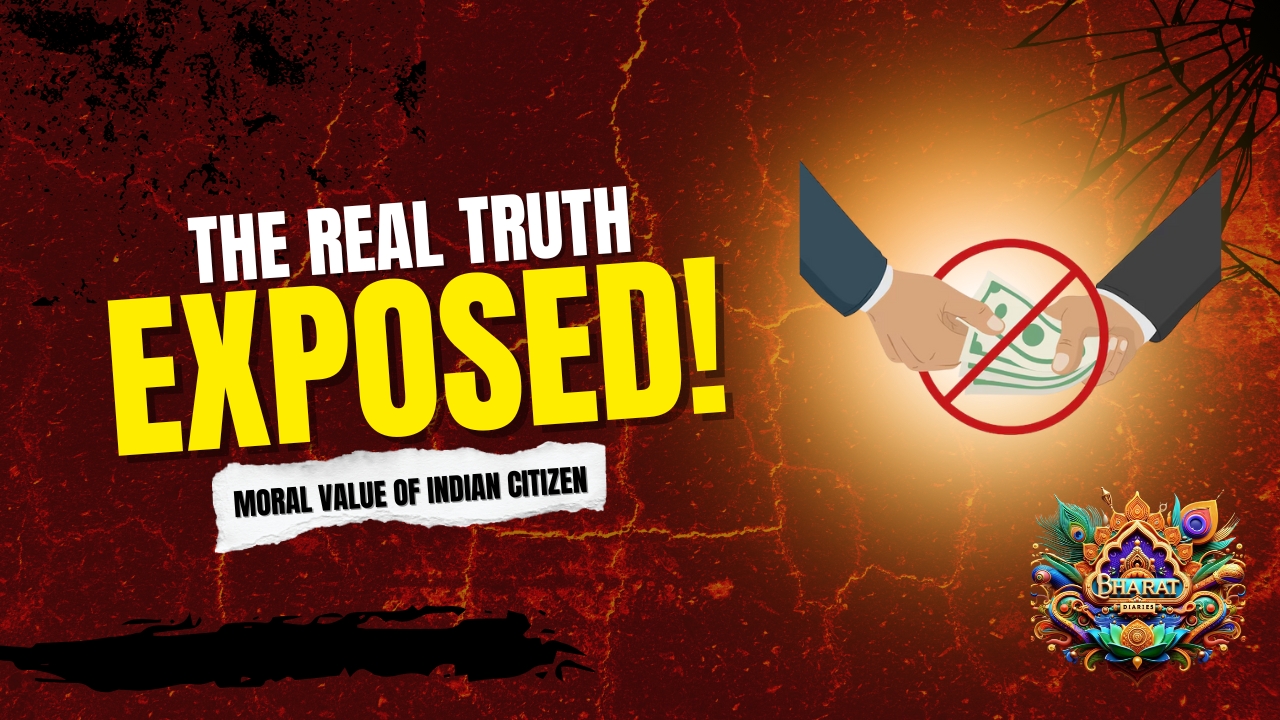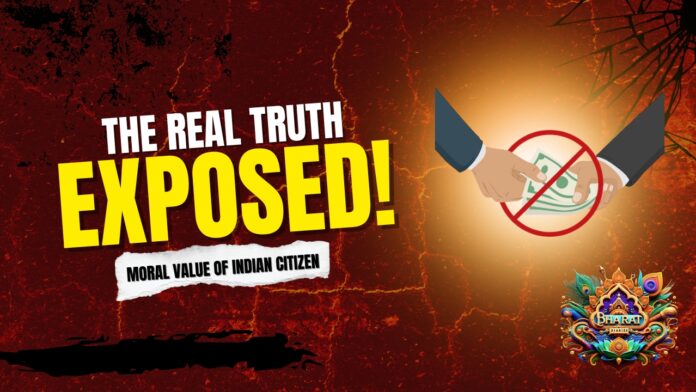
Explore the moral value of Indian citizens, the impact of corruption, misuse of power, and how restoring ethics can build a stronger, united India.
Table of Contents
India is a land of rich traditions, spirituality, and deep-rooted cultural values. From ancient scriptures like the Bhagavad Gita to modern-day teachings of leaders like Mahatma Gandhi and Swami Vivekananda, the essence of Indian society has always revolved around dharma (righteousness) and moral values. Yet, in today’s fast-changing world, one cannot ignore the decline in the moral value of Indian citizens.
Corruption, dishonesty, misuse of power, and hypocrisy have slowly weakened the moral foundation of our society. While people show respect to God in temples, on television, or on social media, the same individuals often fail to practice honesty, empathy, and responsibility in their daily lives. This hypocrisy has created a widening gap between what we preach and what we actually follow.
This is not just a discussion but a wake-up call for every Indian who dreams of a better, stronger, and more ethical India.
What Do We Mean by Moral Value of Indian Citizen?
Moral values are the unwritten rules that guide our behavior and help us distinguish between right and wrong. For Indian citizens, moral values are deeply tied to cultural teachings, family upbringing, and social environment.
Some of the traditional values that shaped India include:
- Truth (Satya): Speaking and standing for truth even in difficult times.
- Non-violence (Ahimsa): Respect for life and humanity.
- Respect for elders and women: A core part of Indian culture.
- Honesty and integrity: In personal and professional life.
- Selflessness (Seva): Serving society without expecting benefits.
Unfortunately, today, many of these values are being overshadowed by selfishness, greed, and a desire for quick success. The moral value of Indian citizens is not lost entirely, but it is under serious threat.
Corruption: The Root of Moral Decline
One of the biggest reasons behind the poor moral standards in India is corruption. From getting a driving license to building a road, corruption touches every aspect of life.
- In government offices: People often pay bribes to speed up their work.
- In politics: Leaders misuse public funds for personal gain.
- In education: Donations and favoritism replace merit.
- In daily life: Even common citizens try to cheat the system, like avoiding taxes or jumping traffic signals.
Corruption is not just about money; it’s about a mindset. It reflects how citizens have accepted dishonesty as a normal practice. This weakens trust in institutions and creates an environment where the honest person feels punished while the corrupt thrives.
Hypocrisy in Morality: Respect for God but Not for Humanity
A common sight in India is people bowing their heads in temples, mosques, churches, or gurudwaras, showing utmost devotion. But outside, the same people may exploit others, lie in business, or ignore the suffering of the poor.
For example:
- A businessman may donate huge sums in temples for publicity but underpay his workers.
- A politician may attend religious rituals on camera but misuse power for personal benefit.
- A citizen may post about “respect for women” on social media but fail to respect women in daily life.
This selective morality is dangerous because it creates an illusion of righteousness while covering up wrong deeds.
Misuse of Power and Its Consequences
Power is meant to serve the people, not to dominate them. Yet, many individuals in positions of authority misuse their power for personal benefits.
Examples include:
- Politicians who manipulate votes and indulge in corruption.
- Officials who demand bribes to perform their duties.
- Common citizens who misuse small powers like favoritism in jobs, exams, or community roles.
Such misuse of power does not remain limited to one person. It affects entire families and future generations. The negative deeds of parents often return as suffering for their children. This is a natural law of justice: what you sow, you eventually reap.
Self-Reflection: The First Step Toward Moral Change
Before pointing fingers at others, it is essential to ask: Am I living a truly moral life?
- Do I pay my taxes honestly?
- Do I follow traffic rules even when no one is watching?
- Do I treat others with respect, regardless of their status?
- Do I use power for service, or for personal gain?
Often, we criticize others for corruption and immorality, but fail to recognize our own mistakes. If every Indian starts with self-reflection and correction, society will automatically improve.
Real-Life Scenarios That Show Decline in Morality
- In education: Students cheat in exams while parents justify it by saying “Everyone does it.”
- On the road: People break signals, causing accidents, but later blame the government for poor traffic systems.
- At work: Employees waste time during office hours but expect full salaries.
- In families: Elders preach respect but often mistreat house helpers or women.
These examples may sound small, but they create a large collective impact, leading to a society where immorality becomes normal.
Why Restoring Moral Values Matters for India
India aspires to be a global superpower, but without strong moral values, this dream will remain incomplete. Corruption-free governance, responsible citizens, and ethical practices are as important as economic growth.
- For a strong democracy: Citizens must vote honestly, without being influenced by money or caste.
- For social harmony: Respect for diversity and humanity must be genuine, not selective.
- For future generations: Teaching honesty and empathy will ensure a stronger India tomorrow.
Steps to Revive the Moral Value of Indian Citizen
- Value-based education: Schools must focus not just on academics but also on ethics, honesty, and social responsibility.
- Leading by example: Leaders, teachers, and parents must practice what they preach.
- Accountability systems: Strong laws to punish corruption and misuse of power.
- Spiritual practice with action: Religion must focus on service to humanity, not just rituals.
- Community responsibility: Citizens should collectively discourage immoral practices like bribery.
The Role of Youth in Building Moral India
India has one of the largest youth populations in the world. If the youth embrace moral values, they can bring a positive revolution.
- Instead of shortcuts, focus on hard work.
- Use social media for awareness, not hypocrisy.
- Refuse to participate in corruption, even in small forms.
- Lead campaigns for honesty, equality, and justice.
The youth can make India not just economically powerful, but also morally strong.
Conclusion
The moral value of Indian citizens is the true backbone of the nation. Corruption, hypocrisy, and misuse of power have weakened our moral structure, but the situation is not beyond repair. By starting with self-reflection, practicing honesty, and building a culture of accountability, India can once again become a land where truth and righteousness guide society.
This is a wake-up call. If we continue to ignore moral decline, nature and destiny will punish us in ways we cannot imagine. But if we act now—with honesty, responsibility, and integrity—we can create an India that is not just powerful in economy and technology, but also in values and ethics.
Moral change begins not with the government, not with society, but with you and me.
